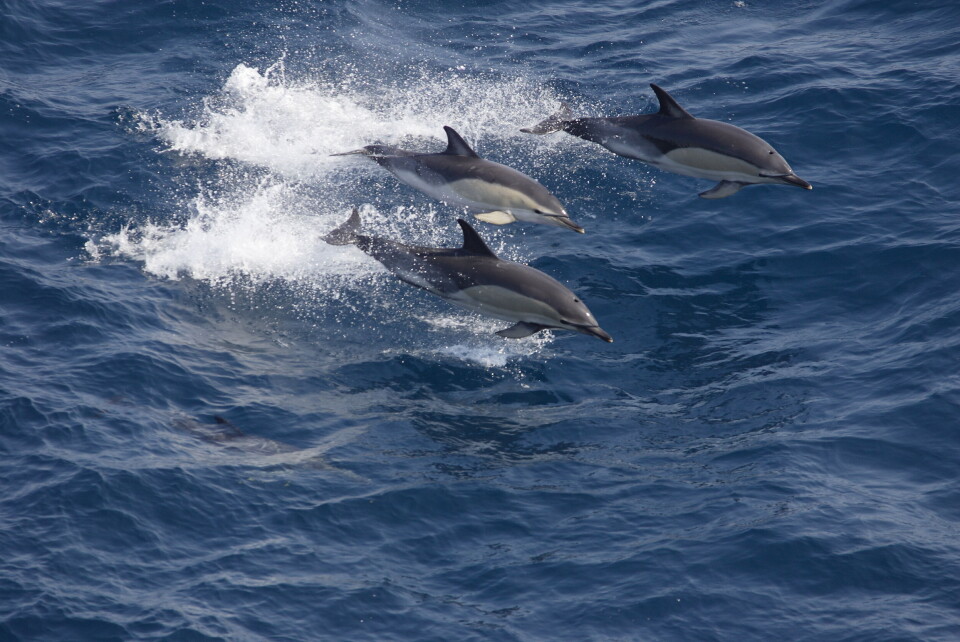-
French Prime Minister confirms use of Article 49.3 to pass budget
Usage opens government up to motion of no confidence but opposition MPs unlikely to find enough support
-
Floor collapses in Paris building leaving 20 injured
Water leaking into the building from balcony is thought to be cause of collapse
-
Homes evacuated and cars submerged as flash floods hit south of France
Alerts continue as schools and roads are closed. Several rivers have burst their banks
Ban fishing in parts of Atlantic, France told, as dolphin deaths surge
This comes as around 900 dolphins have washed-up dead on France’s Atlantic coastline this winter

France’s highest administrative court has ordered the government to introduce no-fishing zones in parts of the Atlantic after a spike in the number of dolphins washing up dead along the country’s western coastline.
The Conseil d’Etat wants that done in six months and also told Paris to better track the number of dolphins accidentally captured as part of fishing operations.
910 deaths over the winter
It comes after a report by marine observatory Pelagis revealing at least 910 small cetaceans - more than 90% of which are dolphins - had washed up dead on France’s Atlantic shoreline over the winter. This included around 500 washing up in a single 10-day period in March.
Most show signs of having been injured in fishing nets and equipment or boat engines, Pelagis said. It is still investigating.
The observatory said flights over the area had shown dolphin carcasses off the coasts of Vendée and Charente-Maritime between the beginning of February and the start of March. It said this indicated that dolphins were still dying in large numbers, even if the numbers washing up on the coast had dropped.
Later, in the single weekend of March 11-12, the wind changed, and “the number of dolphins washing up on the shoreline was unprecedented”, said Pelagis. At least 120 washed up in just two days, it said.
As of Monday, March 20, the group said it had counted at least 500 small cetaceans (dolphins and porpoises) washing up on the coast since March 10. The most common places were:
- Charente-Maritime (27%)
- Vendée (22%)
- Landes (20%)
- Gironde (15%)
- Brittany (14%)
Dolphins at risk of disappearance
NGOs including Sea Shepherd have also been campaigning on the issue. Sea Shepherd filed a complaint against the government, saying that it had not done enough to protect the species. Its lack of action, the NGOs say, risks causing the dolphins to go extinct from the Bay of Biscay.
So far, the government has not banned any fishing in the area. Instead, it has required boats to have onboard cameras, and loud sound equipment, in a bid to check the area for dolphins or to scare them away.
But the Conseil d’Etat specifically ruled that these techniques “do not guarantee” conservation for smaller species, including dolphins and porpoises.
Sea Shepherd has welcomed the ruling, calling it a “victory for dolphins” after six years of campaigning.
VICTOIRE HISTORIQUE POUR LES DAUPHINS !!! MERCI MERCI MERCI A TOUS CEUX QUI NOUS SOUTIENNENT DEPUIS TANT D'ANNEES DANS CE COMBAT. CETTE VICTOIRE EST AUSSI LA VOTRE 💪💙 pic.twitter.com/e6lhQloxsr
— Sea Shepherd France (@SeaShepherdFran) March 20, 2023
Sea Shepherd had also sought to draw attention to the issue by mounting a protest in front of the European Parliament, by displaying the bodies of seven dolphins that had been killed by fishing activity.
They held a banner that read: “Thousands of dolphins are killed each year in France so that you can eat fish.”
Nous sommes devant le @Europarl_FR avec 7 🐬 sur les dizaines qui se sont échoués mutilés ces derniers jours en France, victimes des engins de pêche. 10 000 sont tués chaque année et rien ne bouge ! Une Honte. Fermeture des zones de pêche d'URGENCE !! @Pierre_Ka @EmmanuelMacron pic.twitter.com/lyxOfZGBhZ
— Sea Shepherd France (@SeaShepherdFran) March 14, 2023
In a statement, it said: “The European Commission is too lax and too permissive…[it must take States to court for their failure to] implement the closures of fishing zones, an essential measure.”
It said that it had been waiting for the Conseil d’Etat’s decision.
Related articles
Is it normal that whales are being beached along Brittany coastline?
‘Monster’ cannibal fish in French rivers, but no threat to humans
























